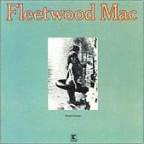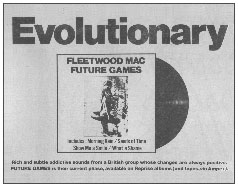![]()
  |

Future Games
Fleetwood Mac
Reprise 6465
Released: October 1971
Chart Peak: #91
Weeks Charted: 12




 Back in the Bar-Mitzvah days of the drug culture the British music scene was shaken by what came to be known as The Blues Boom. Beginning with a small corps of dedicated musicians in the early Sixties, blues bands proliferated at a fervish pace until by 1968 nearly every person in the British Isles between the ages of 16 and 35 was in a blues band. But by its very popularity the blues boom insured its own destruction. After all with so many people in unsuccessful blues bands how could anyone afford to buy anyone else's records? So the boom subsided as the less accomplished musicians in the lot went on to find some measure of economic stability as light bulb designers, pop artists, members of hard rock groups, or what have you.
Back in the Bar-Mitzvah days of the drug culture the British music scene was shaken by what came to be known as The Blues Boom. Beginning with a small corps of dedicated musicians in the early Sixties, blues bands proliferated at a fervish pace until by 1968 nearly every person in the British Isles between the ages of 16 and 35 was in a blues band. But by its very popularity the blues boom insured its own destruction. After all with so many people in unsuccessful blues bands how could anyone afford to buy anyone else's records? So the boom subsided as the less accomplished musicians in the lot went on to find some measure of economic stability as light bulb designers, pop artists, members of hard rock groups, or what have you.
Of the many second generation British blues musicians who remained active Peter Green was among the most promising. During his tenure with John Mayall's Bluesbreakers, Green had distinguished himself as a fine singer and guitarist -- a worthy successor to Eric Clapton. Indeed, on much of Mayall's second American album, A Hard Road, Green was the dominant personality. It came as no surprise when in 1967 Green left the Bluesbreakers to form his own band, Fleetwood Mac.
 Click image for larger view. |
With Then Play On and increasingly in their live performances the band began to show rather disintegrative tendencies, torn between Green's hard-driving intense style, Spencer's imitations of old rock stars, and Kirwan's growing predilection for mush-mouthed balladry.
Green quit and the happy balance of English Rose was lamentably short-lived. Kiln House was released and Christine Perfect (Mrs. John McVie) formerly of Chicken Shack joined the band. While Fleetwood Mac was often very good at this stage, with Green's departure they had suffered a discomforting loss of intensity. Last year while on tour in California Jeremy Spencer quit, defecting to one of the many strange religious cults so popular in Southern California. (I have some sympathy with Spencer. If I had to go to Los Angeles again I might join some strange religious cult). Spencer's place was filled, more or less, by American singer-guitarist Bob Welch.
So, it is with a lineup of Kirwan, McVie, Welch, Fleetwood, & McVie that Fleetwood Mac is heard on Future Games. For my taste, the album has little to commend. Danny Kirwan is out front on most of the cuts and sadly his singing and playing appear to have lost their edge. His voice drones, innocuously, he plays almost aimlessly, and the songs he writes are just too long. One of them, "Sometimes," might have been good but it lingers on purposelessly and painfully for six and a half minutes. Only once, on "Morning Rain" does his playing briefly equal his past performance and his tough, rather disjointed style almost re-emerges. Christine McVie puts in far and away the best performance of the album, but this too is disappointing in the light of her past achievements and potential. Her voice sounds surprisingly weak and emotionless here. Her piano playing too is not up to her know capabilities. Still one of her songs, "Morning Rain" does have its moments. While Fleetwood and McVie handle their rhythm chores competently they have usually been heard to be much better. As for Bob Welch his talent appears to be notable only for its lack of distinction, but perhaps he too has the ability to do better.
Future Games is a thoroughly unsatisfactory album. It is thin and anemic-sounding and I get the impression that no one involved really put very much into it. If Fleetwood Mac have tried to make the transition from an energetic rocking British blues band to a softer more "contemporary" rock group, they have failed. If they have simply lost interest, I hope they regain it in time to salvage what was once a very promising band.
- Loyd Grossman, Rolling Stone, 12/9/71.
Bonus Reviews!
This group has been so much the victim of its own versatility that I daresay many rock cultists, awakened in the middle of the night and sat down in front of a radio, couldn't pick Fleetwood Mac out of a sonic line-up. Well, there are things to listen for: the group likes teamwork -- all five of its members play well enough so that no star must emerge to fill up the sound (which may or may not have had something to do with the departure of guitarist Peter Green). And the group likes to avoid gimicks -- it doesn't need to create effects though distortion or cover anything up with sheer volume. The Mac is, I think, the very model of a progressive rock group, fairly distant from the old rhythm-and-blues roots and able to play all the modern shadings of rock, but still interested only in rock.
The consistency of this album is quite something. The only really weak cut is the brief, aimless jam "What a Shame," for which all five members of the group are listed as composers (remember a camel is a horse designed by a committee). The only general problem -- for me, at least -- is a slight coolness toward the material. On a song with the potential of, say, Bob Welch's "Lay it All Down," the band seems unable to project with either voice or instruments the intensity of feeling that the Stones get from "Wild Horses," my curent example of how a rock band ought to work. Nevertheless, such cuts as "Sometimes" and "Woman of a Thousand Years" are so strong you don't expect to find them both on the same album. Fleetwood Mac is a strong and honest group, and as versatile as ever.
- Noel Coppage, Stereo Review, 2/72.
The British art-rock group comes through personnel changes with consistent quality. Excellent harmonies on the title track. Heavier underground stations will prefer "Lay It All Down" and the instrumental "What a Shame." Good musicianship, well produced by the group.
- Billboard, 1971.
These white blues (and hippie rockabilly) veterans shouldn't have to depend on new recruit Bob Welch's deftly metallized r&b extrapolation for rock and roll, but unless you count the studio jam, they do. And if the best song on the album isn't the slowest, that's only because Welch also has mystagogic tendencies. It's the simplest in any case: Christine Perfect's "Show Me a Smile." B
- Robert Christgau, Christgau's Record Guide, 1981.
By the time of this album's release, Jeremy Spencer had been replaced by Bob Welch and Christine McVie had begun to assert herself more as a singer and songwriter. The result is a distinct move toward folk-rock and pop; this album sounds almost nothing like "Peter Green's Fleetwood Mac." Welch's eight-minute title track has one of his characteristic haunting melodies, and with pruning and better editing could have been a hit. Christine McVie's "Show Me a Smile" is one of her loveliest ballads. Initial popular reaction was mixed: the album didn't sell as well as Kiln House, but it sold better than any of the band's first three albums in the U.S. In the U.K., where the original lineup had been more successful, Future Games didn't chart at all, the same fate that would befall the rest of its albums until the Lindsey Buckingham-Stevie Nicks era. * * *
- William Ruhlmann, The All-Music Guide to Rock, 1995.
With both Bob Welch and Danny Kirwan, Future Games has an appealingly spacy sound, plus Christine McVie's pretty "Show Me a Smile." * * * 1/2
- Steve Holtje, Musichound Rock: The Essential Album Guide, 1996.
![]() Reader's Comments
Reader's Comments
No comments so far, be the first to comment.